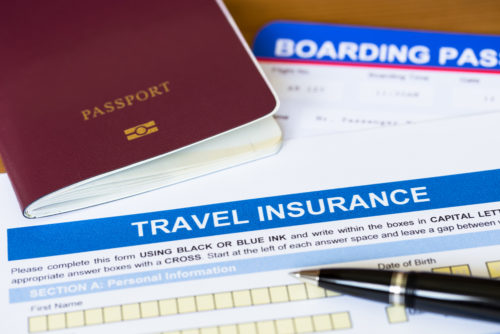When you spend thousands of dollars on flights, hotels, cruises, and other travel plans, the idea of losing that money if something were to go wrong can cause anxiety. There are any number of reasons you might need to cancel or change a trip, but with many travel providers’ restrictions and fees, it’s not always possible to do so without incurring extra costs.
Travel insurance provides an extra layer of protection against those costs, as well as some other benefits, but it also increases the overall cost of your trip. So then, should you spend the money on it?
Table of Contents
What Does Travel Insurance Cover?
Travel insurance policies vary widely in terms of what they cost and what they cover. Not all policies are created equal; for example, some policies allow you to cancel your trip for any reason, while others restrict reimbursements for trip cancellations due to illness, a job loss, a death in the family, or other specific circumstances.
That said, travel insurance typically covers most of the following:
- Medical costs: If you are injured or fall ill on your trip, some travel insurance policies will help cover expenses not covered by your health insurance.
- Trip cancellation: Most travel insurance policies will reimburse you if your trip is canceled due to unforeseen circumstances, such as a death in the family, illness, natural disasters, and strikes or riots in your destination. Some policies also offer coverage if you lose your job, get called for jury duty or to serve as a witness in a trial, or you cancel for any reason. The key to this coverage though, is the word “unforeseen.” If a major storm is forecast for your tropical vacation, a policy purchased after the storm is predicted won’t reimburse you for a canceled trip.
- Baggage and personal items: Travel insurance will cover your losses if your bags are lost or stolen, and will help you if you have a baggage delay.
- Travel delays: If your trip is delayed or interrupted, your insurance may cover alternative transportation, basic clothing and toiletries, food, or accommodations if the delay or interruption meets specific criteria.
- Liability: If you are involved in an incident that leads to bodily injury or damage to property, travel insurance provides liability coverage.
Other common features of travel insurance include 24-hour traveler assistance, accidental death or dismemberment coverage, emergency evacuation coverage, rental car coverage, identity theft coverage, and concierge services. Some policies even offer coverage for specific activities: for example, you may be able to seek reimbursement of greens fees if you aren’t able to play a planned round of golf during your trip.
The limits on each of these coverages, as well as the restrictions, vary by policy. Some providers allow travelers to purchase add-ons, or riders, to increase the flexibility or reimbursement limits of their policy.
How Much Does Travel Insurance Cost?
If you have a credit card that provides travel insurance as a benefit, the coverage is free. If you purchase insurance separately, it typically costs 4% to 10% of the total cost of your trip, including airfare and accomodations. Prices may vary widely based on where you’re traveling, the overall cost of the trip, and any optional coverage you choose. The closer it is to your departure date, the more the coverage costs as well.
To give you an idea of how much you’ll pay for travel coverage, assume you have booked a cruise for your family of two adults and two children. This one week cruise to Mexico costs you $6,000 for the cruise and airfare. Assuming you purchase coverage the day you book the trip, travel insurance will cost you $134 to $380, depending on the provider.
If you were to select the $134 policy, you would be covered for the full cost of the trip ($6,000) if it is canceled for specific reasons, including the death of one of the travelers, or interrupted (such as you miss the cruise due to an airline delay). You would also be eligible for reimbursement for lost or delayed baggage (up to $750), change fees ($250) and missed flight connections ($300). Additionally, the policy provides emergency medical coverage of up to $10,000, and $100,000 towards emergency evacuation costs.
A more expensive policy offers higher reimbursement limits, as well as the option to purchase an add-on that allows you to cancel the trip for any reason, not just the unforeseen events detailed in the policy. Depending on your circumstances, that extra cost may be justifiable.
Some insurance companies offer annual travel insurance coverage plans that will cover all of your trips during the coverage year. If you travel often, such a plan could be a good value. However, read the policy details carefully, as the annual reimbursement limits may be lower than those on policies for individual trips.
Do You Need Travel Insurance?
If you’re already shelling out thousands of dollars for a vacation, spending an extra couple hundred dollars on travel insurance may not seem like a big budget splurge. Still, the money you spend could be put toward other expenses, such as meals or souvenirs, so consider the pros and cons before opting to buy.
Pros of Getting Travel Insurance
- Peace of mind: Adding travel insurance to your trip can help you relax, knowing that if something doesn’t go as planned, you won’t lose money or be stuck somewhere without help.
- Protection from risk: If you are traveling at a time when travel disruptions are likely, such as during hurricane season, travel insurance reduces your risk of losing money if you can’t travel.
- Help when you need it: If you have trouble while you’re traveling, your travel insurance company will provide assistance.
- You won’t be left stranded: With travel insurance, you’re covered when flights are delayed or canceled, and you won’t be stuck sleeping in an airport. Travel insurance will reimburse you for costs incurred when your trip is delayed or disrupted, so you can get a hotel room or rental car and a new toothbrush if you need one.
- Depending on the policy, medical care may be covered if you get sick or injured.
Cons of Getting Travel Insurance
- Terms can be strict: Just because you purchase travel coverage doesn’t mean you can use it. Unless you purchase a “cancellation for any reason” policy, for example, you could be out of luck if you can’t travel for a reason that’s not listed on the policy.
- Your credit card may cover you: Many credit cards provide travel insurance coverage that’s comparable to, or even better than what’s offered by a travel insurance company. This coverage kicks in when you purchase travel on the card.
- You may not need the coverage: In many cases, especially if you are traveling in the U.S., your existing insurance coverage will cover most of the same expenses as travel insurance. In fact, your travel insurance may only kick in after your primary insurance is billed. Your health insurance, for example, will cover your medical expenses if you are ill or injured in the U.S., or your car insurance may cover rental cars as well as your personal vehicle.
- You may have other options: If you haven’t prepaid for a trip, you may be able to cancel or reschedule it with little or no expense. For example, many hotels allow free cancellations up to 6 p.m. the day of arrival. Airlines will also allow you to rebook on a different flight when weather threatens or when someone is ill. If you book your travel with the least amount of restrictions, you can change your plans without travel insurance.
- It’s non-refundable: If you purchase travel insurance, you won’t get your money back if you don’t use it.
So Should You Buy Travel Insurance?
Ultimately, the decision about whether to buy travel insurance comes down to your own risk tolerance and budget. Generally speaking, for a short trip within the U.S., you don’t need to spend the extra cash. Your credit card and personal insurance policies will cover unexpected problems.
If you are traveling outside of the U.S., though, travel insurance may be worthwhile if only for the medical expense and evacuation coverage that some plans offer. Many health insurance policies have limited coverage outside of the country, and Medicare doesn’t cover foreign medical expenses at all. If you need to be evacuated from another country for a medical emergency, the cost can be staggering. Travel insurance will reduce the burden.
Travel insurance is also a good idea for cruises. Flights may be delayed or cancelled, keeping you from boarding on time. And again, you can’t purchase insurance once a storm is predicted, so buying coverage when you book a flight or cruise ensures you can cancel if a hurricane is on the horizon.
Image Source: https://depositphotos.com/





